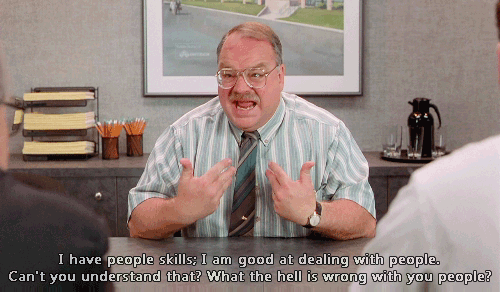This is the first in an occasional series of posts on using “old school” recruitment actions to increase your bottom line results.Today’s discussion is on candidate experience or should I say the current lack of positive experiences and a few steps to eradicate this turning a turn down into an asset instead of a liability.
 We constantly hear stories about bad experiences by candidates. And not just about the lack of personalization in the pipelining process. I personally sent out over 600 resumes in a 10-month period while exploring a change in employment. For the metrics freaks out there I received back 62 personal (or HRIS system) responses and 38 “your qualified we are passing on you” emails. I also received 12 email and 7 phone calls that converted to 3 interviews. During that same time, I had 3 organizations interview me because of referrals. I also had 4 recruiters find me unsolicited and that converted into 2 interviews.Only half the experiences where I interviewed would get a passing grade and 1 would get an “A” if I was grading the experience.
We constantly hear stories about bad experiences by candidates. And not just about the lack of personalization in the pipelining process. I personally sent out over 600 resumes in a 10-month period while exploring a change in employment. For the metrics freaks out there I received back 62 personal (or HRIS system) responses and 38 “your qualified we are passing on you” emails. I also received 12 email and 7 phone calls that converted to 3 interviews. During that same time, I had 3 organizations interview me because of referrals. I also had 4 recruiters find me unsolicited and that converted into 2 interviews.Only half the experiences where I interviewed would get a passing grade and 1 would get an “A” if I was grading the experience.
One inexperienced recruiter asked me inappropriate questions then abruptly stopped when her computer failed and she didn’t have a teleprompter to assist in interviewing this an example of a personal experience of an experienced senior executive with 15 years in the C-suite, I can’t image the experiences of the typical candidate daily. If this an example of a personal experience of an experienced senior executive with 15 years in the C-suite, I can’t image the experiences of the typical candidate daily.
So, for all of you in the game for a month or a career and everything in between, let me offer a few examples of how to create a positive experience. One that will be less bitter for your candidates and just might be less bitter for your candidates and just might yield you so good will.
During my time recruiting for Limited Brands corporately two decades ago we had a goal of all interviewed candidates being brand ambassadors regardless of whether they received an offer or not. We viewed candidates as customers (many were literally) and wanted their experience to be as positive as a great shopping experience, where even if you didn’t make a purchase, you came back again and told friends and families too.

Positive Candidate Experience Interviewing Protocol:
- Treat all candidates as if they are the only candidate. Give them a fair shot, don’t shorten an interview because you liked someone else. Often my first reaction changed, not often but enough that short selling someone on their first 5 minutes could lose you the best person for a role.
- Follow up quickly if there are inquiries during the process.
- Use a rubric so that you ensure you cover the same topics with everyone. Certainly, going off script is fine, just make sure every candidate has the same baseline to make decisions on.
- At the end of each process talk to each candidate you pass on personally. No dear john letters. The conversation can be short and sweet; however, they have invested in the process too and should be shown some dignity and respect. Most candidates know you are speaking to multiple folks so do not compare or contrast. You can reaffirm they have positive qualities and skills. Let them down easy. Also, offer to keep your eyes out for other roles.
People will boomerang for a different position down the road. Sometimes they will refer a colleague after the fact. Sometimes they will use your product or service too.
 Some recruiters will scoff at calling folks afterward. They will tell you they don’t have time. To that I say bullshit. If every job has 6 candidates interviewed in person, then it’s 15-20 minutes to make 5 phone calls. We wasted that on non-valued work on any given day. Schedule a half hour once a week or every other week to let folks down. I have never had a single candidate get mad at me for doing so. In fact, most sincerely appreciate the “human” in human resources instead of a cold letter.
Some recruiters will scoff at calling folks afterward. They will tell you they don’t have time. To that I say bullshit. If every job has 6 candidates interviewed in person, then it’s 15-20 minutes to make 5 phone calls. We wasted that on non-valued work on any given day. Schedule a half hour once a week or every other week to let folks down. I have never had a single candidate get mad at me for doing so. In fact, most sincerely appreciate the “human” in human resources instead of a cold letter.
About Our Author:
 Mark Fogel is a Disruptor in the HR space and known for his HR with an Attitude. With 15 years heading HR at 3 prominent organizations and a slew of National Awards, including the SHRM Human Capital Leader of The Year, he has made a major impact on the Human Capital function. He is also the co-founder of Human Capital 3.0, an HR boutique with some very big clients. Often quoted in national media, Mark is an HR Thought Leader with a unique point of view. He can be reached at [email protected] or follow him on twitter at @HC3.
Mark Fogel is a Disruptor in the HR space and known for his HR with an Attitude. With 15 years heading HR at 3 prominent organizations and a slew of National Awards, including the SHRM Human Capital Leader of The Year, he has made a major impact on the Human Capital function. He is also the co-founder of Human Capital 3.0, an HR boutique with some very big clients. Often quoted in national media, Mark is an HR Thought Leader with a unique point of view. He can be reached at [email protected] or follow him on twitter at @HC3.
By Mark Fogel
Recruit Smarter
Weekly news and industry insights delivered straight to your inbox.





